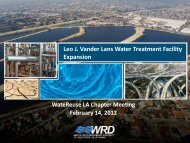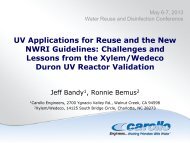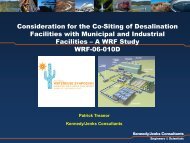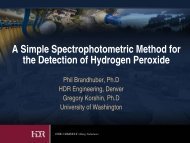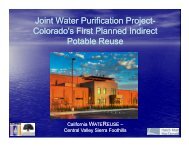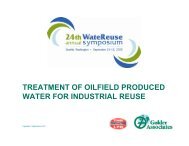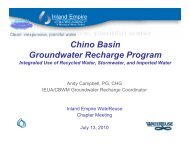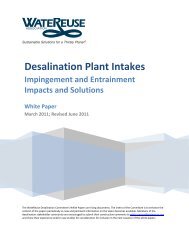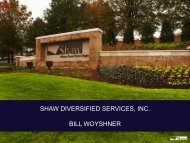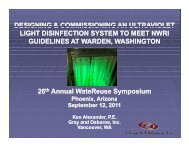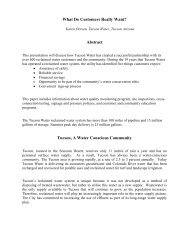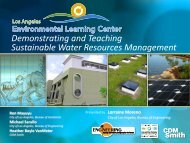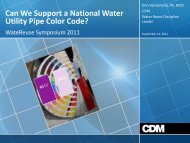Conference Program - WateReuse Association
Conference Program - WateReuse Association
Conference Program - WateReuse Association
You also want an ePaper? Increase the reach of your titles
YUMPU automatically turns print PDFs into web optimized ePapers that Google loves.
WATER REUSE &DESALINATIONBRIGHT AS THE FLORIDA SUNTuesday Schedule of Events7:00 a.m. – 2:00 p.m. Registration (Grand BallroomRegistration)7:00 a.m. – 3:30 p.m. Exhibit Hall Open (Salons A–E)7:00 a.m. – 8:00 a.m. Continental Breakfast withExhibitors (Salons A–E)8:00 a.m. – 12:30 p.m. Water Reclamation Facility Tour(Departing from Hotel Lobby)8:00 a.m. – 9:30 a.m. Concurrent Technical SessionsA-3: Desalination—Realities and Implementation Strategies(Salons I&J)Significant strides made over the last 10 years in understandinghealth risks and the required water treatmentbarrier technologies are not enough to ensure the effectiveutilization of reuse water. Long term perspectiveson water scarcity must be understood and validated inorder to gain the public’s support for reuse. These perspectivesmust be accompanied by a well-orchestratedbranding and acceptance of reuse, portraying risks andbenefits clearly. And, finally, the real costs of reuse mustbe understood. This is where it gets complicated due tothe intangible and often intrinsic value of reuse in oursociety. This Session has it all… the impact of climatechange on future water supplies, branding strategies andthe cost or reuse.B-3: Research on Innovative Treatment Technologies (Salon F)The goal of the <strong>WateReuse</strong> Foundation project WRF-02-009, Innovative Treatment Technologies for ReclaimedWater, is to measure the pathogen and pollutant destructionability of conventional and emerging technologies.The preliminary results of this project indicate that thereare market ready technologies that provide pathogen andpollutant destruction at a relatively low cost. This sessionis a three-part presentation of cutting edge researchresults from WRF-02-009, including bench top analysisand pilot analysis. Technologies to be discussed includeUV, UV/H2O2, peracetic acid (PAA), PAA/UV, Ozone,Ozone/ H2O2, chlorine, and TiO2/UV.C-3: Agricultural Use of Reclaimed Water (Rooms 8–10)This session will present three papers on the subject ofAgricultural Use of Reclaimed Water. There are two presentationson the Monterey County water reclamationprogram. The first will present the findings of a six yearstudy to measure the effects of using reclaimed water oncrop production and soils in this important agriculturalarea. There will also be a presentation of the MontereyCrisis Management Plan which was developed to provide aframework for dealing with a wide range of crisis that mayarise. The discussion will focus on safety related crisis andthe response to the recent E. coli outbreak associated withspinach will be used as an example. The third presentationwill chronicle the development of an agricultural reuseprogram in Gilroy California including end user concernsand design features of the final program.D-3: National Legislative Outlook Forum (Salons G&H)Moderated by Richard Atwater, First Vice President of the<strong>WateReuse</strong> <strong>Association</strong> and CEO/General Manager of theInland Empire Utilities Agency, this session will focus onthe need and prospects for national and state legislationrelated to water reuse and desalination. Confirmed panelistsinclude Roseann Gonzales of the U.S. Bureau ofReclamation, Mimi Drew of the Florida Department ofEnvironmental Protection, and Michael O’Neal of the U.S.Department of Agriculture. Invited panelists include SteveLanich of the House Committee on Natural Resources.9:30 a.m. – 10:00 a.m. Refreshment Break withExhibitors (Salons A–E)10:00 a.m. – 12:00 p.m. Concurrent Technical SessionsA-4: Groundwater Desalting (Rooms 8–10)When the general public thinks of desalting for watersupply, they typically think of seawater desalination onthe coasts. Admittedly, more and more states and agenciesare looking to the ocean as a future component of theirwater portfolio but many more are looking at a resourcemuch closer to their customers: brackish groundwater.There are many more existing and planned brackishgroundwater desalting facilities than there are seawaterfacilities. These facilities, many of which are in the aridsouthwest, bring different challenges particularly in theareas of process selection and in concentrate management/disposal.In this session, you will hear about severalgroundwater desalting projects in different stages ofdevelopment. Unique approaches to treatment using bothmembrane and ion exchange processes will be presentedas will alternative methods for concentrate management.In addition to the three specific projects, you will hearfrom the Bureau of Reclamation on the status of theresearch that they are doing to advance the science ofbrackish water desalting technologies and to reduce the28



